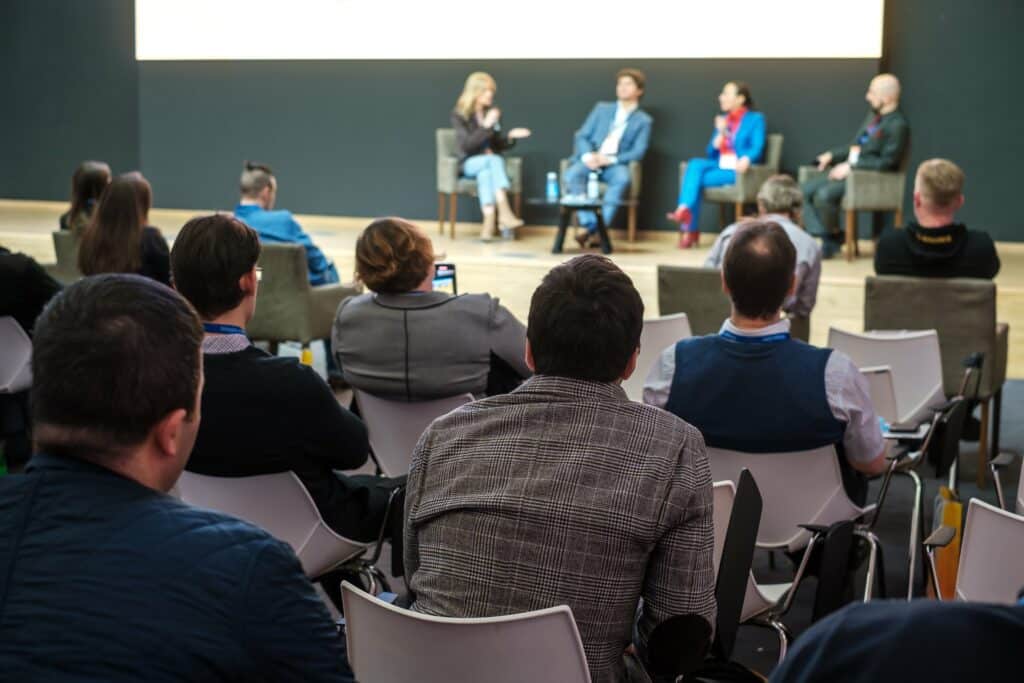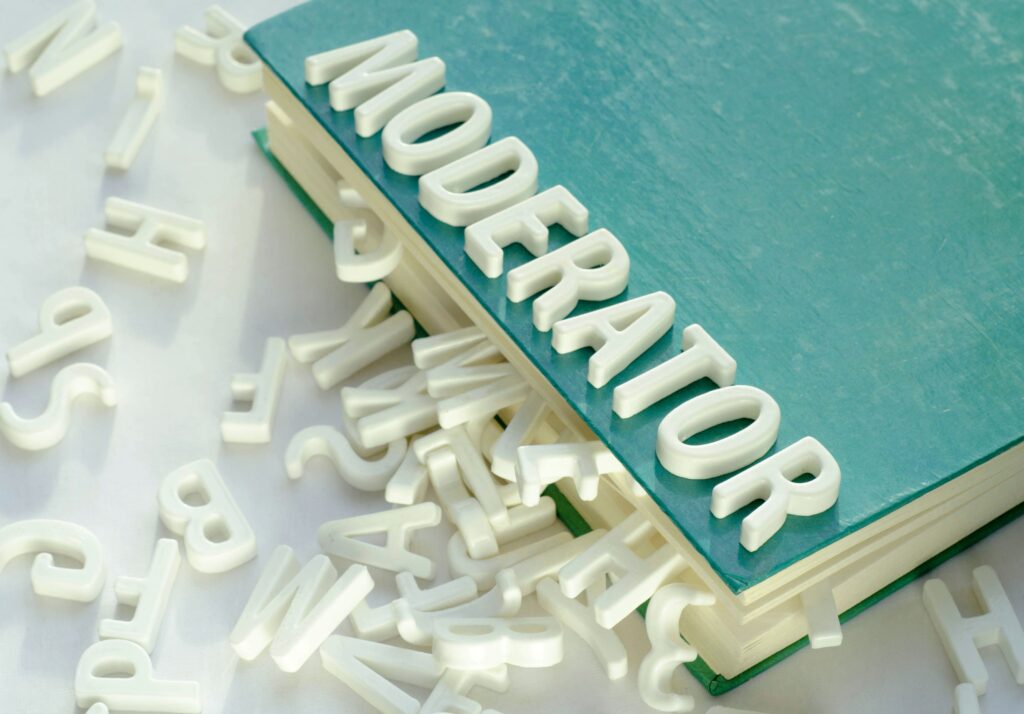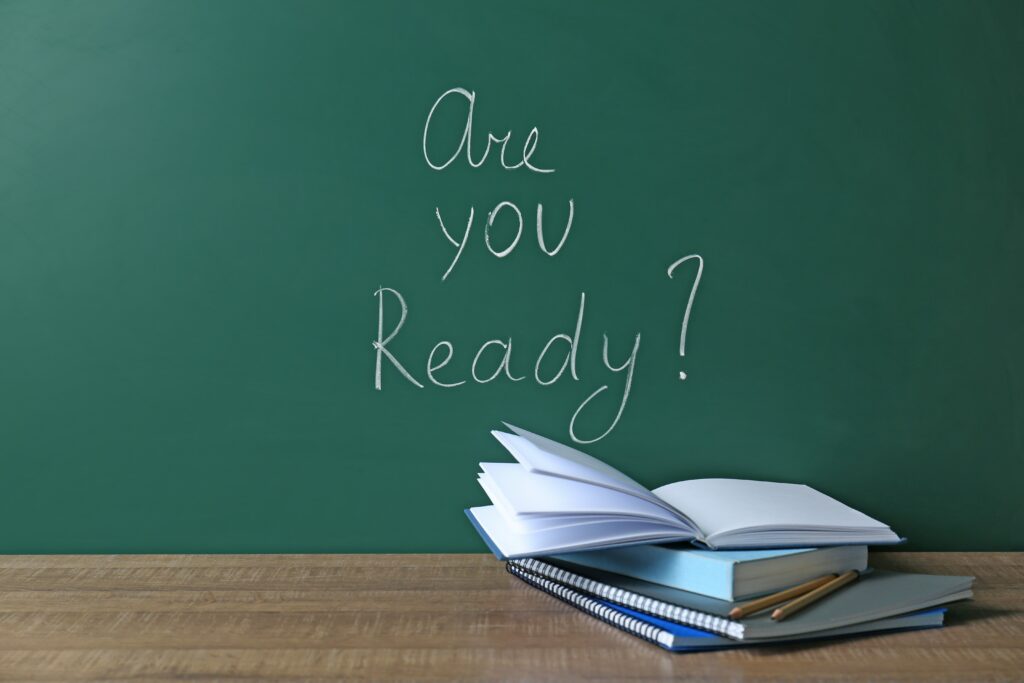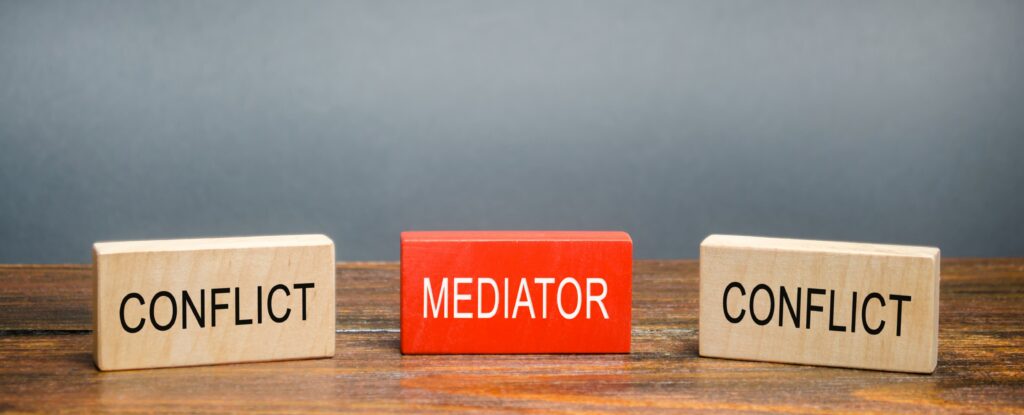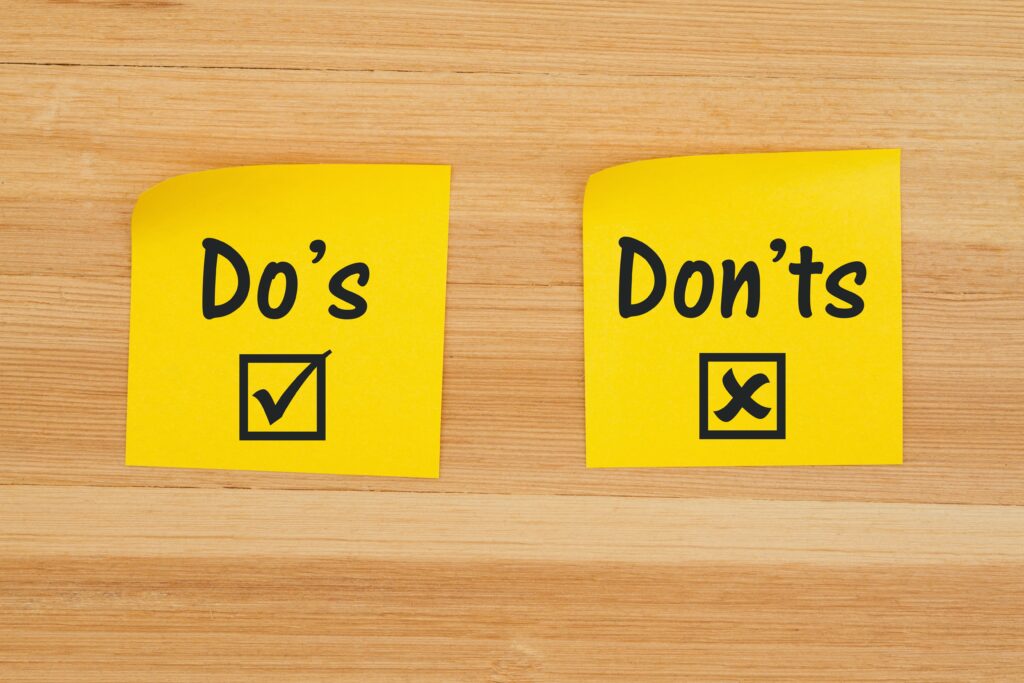In this Article...quick links
- What is a panel discussion?
- How long should panel discussions be?
- What is the role of the moderator?
- What does a moderator do?
- How do you prepare for a panel discussion?
- How to structure a panel discussion
- How to start a panel discussion as a moderator.
- How to end a panel discussion.
- 10 Do’s and Don’ts for moderating a panel discussion
- Need expert guidance in preparing for a panel discussion?

Now that ‘in-person’ events are back in full swing many of us are organising and attending conferences, both internal and external for the first time in a few years. One of the key components of modern-day conferences is the panel discussion.
So not surprisingly, we are increasingly being asked about the dos and don’ts of speaking on a panel, what makes a great panel discussion and how to moderate a panel discussion.
What is a panel discussion?
Panel discussions allow industry experts to come together to discuss a specific topic or trend from different and diverse perspectives.
Typically, there are 3 – 5 panellists and a skilled moderator. The moderator will ask a series of pre-set questions after which the audience is invited to ask questions, sometimes pre-approved or by invitation.
How long should panel discussions be?
They typically last from 45 minutes to 1 hour, so relatively short, and therefore it is vital that the time is managed well in order that everyone gets a chance to express their POV, answer set questions and respond to audience questions. Done well, panel discussions are audience focused, engaging, thought-provoking and inspiring. Done badly, they are boring, repetitious, unstructured and off-topic.
In a previous article, we focussed on the role of the panellist and how to prepare to speak at an industry panel event. If you have been invited to moderate a panel discussion, however, it’s probably safe to say that you are already a confident and accomplished public speaker.
In this article we will throw some light on what it takes to put together an engaging panel discussion, plus importantly, a practical list of dos and don’ts for the moderator. As with everything, the key is in preparing and keeping the audience’s needs front and centre.
What is the role of the moderator?
A good moderator needs to be an effective communicator, be proactive in managing the panel, be able to engage with the audience, be a good listener and above all, possess a high level of diplomacy. The success, or failure of the event, is highly dependent on the skills of the moderator.
What does a moderator do?
Specifically, the nine duties and responsibilities of a moderator are:
- Setting the questions in advance (with assistance if required)
- Introducing the event and setting out the goal(s) and rules
- Introducing the panel members
- Time management
- Keeping the discussion moving forward
- Ensuring each panellist has their say / prevent one person from dominating
- Clarifying points of discussion and adding meaning
- Keeping the panellists on topic
- Managing audience Q and A sessions
How do you prepare for a panel discussion?
If you’ve been asked to moderate a panel discussion then it’s likely that a conference planner / organiser has set the topic of discussion already, but they may or may not have selected the panel at this point. So, it’s important for the moderator to understand a number of factors at this early, pre-preparation stage.
- Decide what is the purpose of the panel.
It sounds obvious but you’d be surprised at how many panel events don’t clearly define this in advance other than providing the topic heading. Is it to understand diverse views, challenge existing opinions, or perhaps to provide entertainment? If it’s an internal (company) panel, it might be to promote a new product or service.
Understanding the goal of the panel will help to set the tone of the event; serious and formal or casual and informative / entertaining.
- Who will be attending?
This is key to understanding how or why the subject matter is important to the audience. The organisers should have a list of attendees and importantly, their level of seniority and specific area of expertise which will help you to determine the goal, style and format of the event.
- Choosing people for the panel
If the panellists have not already been chosen then ask to be involved in their selection. Ideally, you want the panel as a whole to have a broad range of knowledge on the subject, diverse views or perspectives and interesting, confident personalities. They should all be experts in their field who can contribute something unique to the discussion.
Research their previous events and specifically how they answer questions, both from the moderator and the audience. If the panel members are too similar or unbalanced then it doesn’t make for an interesting conversation.
- A prepared panellist is a good panellist.
There is a lot of preparation work that goes into, what appears to be, a spontaneous discussion. It is important for the moderator to brief the panellists in advance on timing, discussion points, the questions that will be covered and who is in the audience. It’s also worth setting ground rules regarding interruptions etc. and repeating these at the start of the event. Well prepared panellists will lead to a much more entertaining and engaging event.
It’s also helpful to brief the panellists on the space. Some considerations include:
- Will they be seated or standing? If seated, is it a chair or a stool? This can impact clothing, if on a stool they may not want to wear tight trousers or a skirt, for example.
- Will they be behind a desk?
- Will the microphone be handheld, or worn on the lapel?
The more comfortable everyone is the more productive the conversation will be.
- Focus on the audience.
Remember that the most successful panel discussions are audience focussed.
There are a number of ways to include and engage the audience, either beforehand or during the event. If appropriate to the topic, you could ask the organisers to conduct a short questionnaire ahead of the event. This allows the facilitator to capture and reference common views or statistics before the panel discussion starts.
Asking the audience certain questions at pivotal points during the discussion (using a simple show of hands) is a good way to gauge if these views have changed as a result of the panel’s discussion.
In addition, you could ask attendees to submit questions in advance. This will also help you to keep the discussion on track in terms of audience expectations.
At larger events, it’s a good idea to have at least three, pre-selected members of the audience ready and prepared to ask a question. If no one want’s to be the first to put up their hand then the event could stall.
- Setting the questions
The moderator is not always an expert in the field of discussion although it is important that they have enough broad knowledge of the subject so that they can add meaning and detect when a panellist is waffling or off-topic. The moderator will frequently work with the organisers to set the questions. Ideally, the organisers will have canvased questions from the attendees in advance and this will help the moderator to identify common themes or concerns. But make sure there is at least one question that evidences each panellist’s specific field of expertise.
- Prepare for a difference in opinion
If the panel has been selected well then the moderator should expect strong, differences of opinion and be prepared for potential areas of conflict. We suggest panellists read our specific advice to follow when answering questions and how to always remain courteous, on-track and respectful of the question-asker – so that in turn, they look professional and knowledgeable.
Prepare your ‘cut-off’ lines ahead of time. It’s likely you’ll encounter some waffling, off-topic discussion or non-answers to specific questions. Make sure you have a number of phrases you can use to get the discussion back on track. Things like ‘whilst that’s interesting can we get back to point b’, or ‘thank you for that, now let’s hear from x’.
It is vital that the facilitator remains – and appears to remain – neutral at all times. Be very aware of your own body language if things get heated. Think about what non-verbal clues you might be sending and try to keep your stance natural and open at all times, and avoid fidgeting.
How to structure a panel discussion
As a panel moderator, always be mindful of time. Time management is key and critical to a well-run event. Make a plan and stick to it. A stopwatch might be useful for this.
Timing guidelines for a great panel discussion
Let’s say the event lasts 60 minutes in total, there are 5 panellists and a live audience. You should prepare a one-minute subject overview and introduction and then allow 30 seconds to introduce each panellist. You’ll also need to allow 30 seconds to one minute to wrap up the session. So that’s 4.5 minutes. At the end of the discussion, you want to allow 15 minutes for questions from the audience.
That leaves 40 minutes for moderator-facilitated questions. The number of questions will be determined by the format and tone of the event. But as a general rule, let’s say you allocate 5 minutes for each question / discussion, so that means you’ll need eight questions. If the subject matter is complicated, then you may want to reduce the number of questions. If the format is informal and you’re looking for short, sharp quick-fire answers then you might want to increase the number. Not every question needs to be answered by every panellist!
How to start a panel discussion as a moderator.
When opening your panel discussion, follow these steps:
- Start with a warm greeting and if you haven’t already been introduced then briefly state your name and a relevant fact that establishes your credibility as moderator.
- Introduce the subject matter with a startling statistic, quote or fact and then provide a brief overview of the format and the goal of the event.
- Introduce each panellist focussing on their specific area of expertise and why they have been chosen for the panel.
- Keep your style friendly, open, informative and neutral to set the tone of the discussion and then get straight into the questions.
How to end a panel discussion.
To successfully close a panel discussion, follow these steps:
- You may want to allow each panellist time for a closing remark, but don’t leave this open to interpretation or they are likely to repeat something they have already said. Instead, ask a specific question such as, ‘what is the one thing you have learnt today?’, something that warrants a short, sharp answer.
- Thank each of your panellists, the audience, the event organisers and any sponsors.
- And finally, let the audience know if there have been any arrangements made – email discussion group, informal time with the panellists after the event – where they can continue the conversation.
It’s worth saying again that preparation is key to a successful panel event, so do your homework upfront and be prepared.
Finally, let’s wrap up with some handy dos and don’ts.
10 Do’s and Don’ts for moderating a panel discussion
Do:
- Over-prepare. If you are under-prepared this will become evident immediately.
- Have a say in the panel selection.
- Stay engaged the whole time. Actively focus on the person speaking.
- Get comfortable. You’ll be in this position for up to an hour.
- Look the part. Dress appropriately for the occasion.
- Keep panellists on topic.
- Make sure the panellists have an equal share of the discussion.
- Stay on time.
- Serve the audience.
- Make sure microphones are available for the audience.
Don’t:
- Accept the role if you don’t have the appropriate field of knowledge.
- Engage in self-promotion.
- Fail to intervene.
- Talk too much.
- Go down the line every time, not every question has to be answered by each panellist. Choose the most appropriate.
- Fail to meet the goal.
- Forget the audience.
- Indulge in long intros.
- Fidget. Be mindful of your non-verbal, body language cues.
- Go over the time limit.
Prepare Yourself for Success
When you moderate or speak at a panel event, there’s lots to consider. It’s not just your notes you need to organise – you also need to be ready to respond to questions and arguments, and to work in cohesion with the panellists to ensure an entertaining and informative discussion is delivered.
The key here is to understand your audience and be thorough in your research and preparation – that way you can be a more confident presenter and ready for anything that arises.
Need expert guidance in preparing for a panel discussion?
If your moderator, or speaking or presentation skills could benefit from a tune-up, or a complete overhaul, our high-intensity coaching is a game changer. Get in touch with us to find out how it can benefit your people and business.
To find out more, click on one of the buttons below:

Belinda is the Co-Founder and Managing Director of SecondNature International. With a determination to drive a paradigm shift in the delivery of presentation skills training both In-Person and Online, she is a strong advocate of a more personal and sustainable presentation skills training methodology.
Belinda believes that people don’t have to change who they are to be the presenter they want to be. So she developed a coaching approach that harnesses people’s unique personality to build their own authentic presentation style and personal brand.
She has helped to transform the presentation skills of people around the world in an A-Z of organisations including Amazon, BBC, Brother, BT, CocaCola, DHL, EE, ESRI, IpsosMORI, Heineken, MARS Inc., Moody’s, Moonpig, Nationwide, Pfizer, Publicis Groupe, Roche, Savills, Triumph and Walmart – to name just a few.

